Why is WholeFoods STILL using Canola Oil? (Hint: It’s NOT good for you!)
In the last 10 years, Wholefoods has practically become a “religion” in the United States. People flock there (myself included!), swayed by good branding and a nice big fresh fruit and veggie section when you walk in the door that makes you think that everything after that is going to be just as fresh, organic, non-GMO and good for you. For the prices you pay, it better be…right?! Well…
All information in this article is for educational purposes only.
It is not for the diagnosis, treatment, prescription or cure of any disease or health condition.
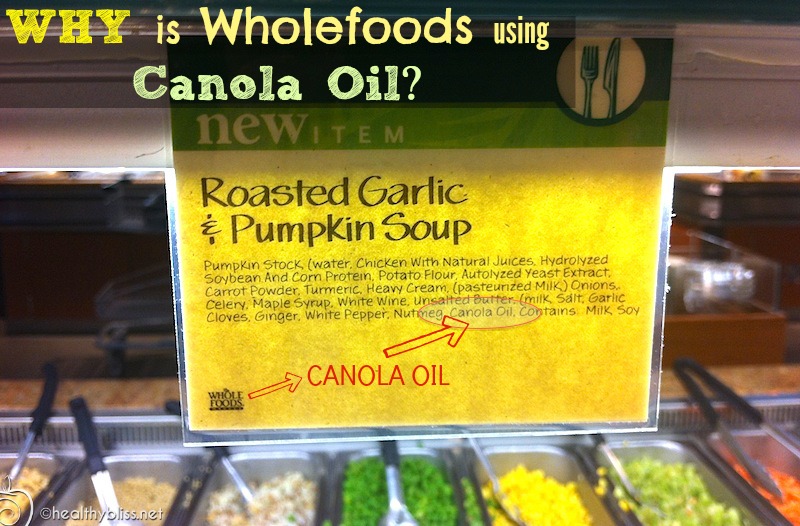
Extra Virgin Olive Oil tastes wonderful in a homemade soup. There is simply no need to use inferior ingredients.
My personal “bad food” radar is usually set for food additives and various forms of hidden Monosodium Glutamate (MSG) found in so-called healthy foods, which I can find in mass abundance on the shelves in every supermarket, including Wholefoods. The food label trickery is simply through the roof. But, you don’t have to be a biologist or scientist to see CANOLA OIL on many labels right there in the ingredients. It’s one you should definitely AVOID. And the worse offender at Wholefoods is in their baked goods and salad bars.
What is Canola Oil and why it’s is Bad for you
You probably never really thought about canola oil and simply thought it was oil from canola, just like olive oil is from olives and sunflower oil is from sunflower seeds. That would make sense in a normal, non-genetically modified world. But, the reality is that there is no canola plant. “Canola” is a made-up word from a GMO plant that has unknown consequences to your health.
Canadian Oil + Low Acid = Canola Oil
Canola oil is made from genetically modified rapeseed plants. The problem was that “rapeseed oil” was so toxic that the FDA banned it for human consumption in 1956. In the 1970’s, Canadian growers bred a new variety of rapeseed with a lower content of the toxic erucic acid, and the name of the new oil was L.E.A.R. (Low Erucic Acid Rapeseed) oil. Eventually, it was renamed “Canola” for marketing reasons, because no company wanted to be associated with a product having “rape” in its name and “rapeseed” oil was well-known to be a toxic oil.
The term Canola was coined from “Canadian oil, low acid” to convince consumers that this “newer and better” rapeseed oil was safe to eat. You see, rapeseed oil was banned from foods, probably because it attacks the heart to cause permanent degenerative lesions. The truth is that rapeseed is the most toxic of all food oil plants. Even insects won’t eat it! That’s right, Canola oil is a very effective insecticide, and it is the primary ingredient in many “organic” (non-chemical) pesticide control products sprayed on vegetables to kill bugs.
The rape seed is part of the mustard family of plants. Mustard gas was made from rapeseeds and used in World War II for genocide.
It is estimated that 93% of the canola oil currently sold in the US has been genetically engineered (GMO). But, since pure non-GMO rapeseed is proven to be toxic and unsafe for human consumption, how can even 7% of canola oil be non-GMO? It seems to be a scientific impossibility, or simply a play on numbers. At best, I’d call it a marketing oxymoron!
Even IF you were eating the 7% “safe” canola oil, is it really safe?
The process of heating canola oil during manufacturing is so extreme that the oil actually becomes rancid and has a terrible smell. The odor is so bad that the manufactures have to deodorize the oil so it doesn’t smell bad! All food grade canola, including the varieties sold in health food stores, are deodorized by 300 degree Fahrenheit high-temperature refining to remove its natural terrible stink.







Symptoms of Intolerance or Allergy to Canola Oil
Rape oil itself has been shown to cause emphysema, respiratory distress, anemia, constipation and blindness in animals and humans. I have personally worked with clients who experienced intense heart palpitations after eating canola oil or products containing canola oil. Once we took the canola oil out of their diet, their symptoms disappeared. Can you imagine if you thought you were having an anxiety attack, only to find out that you were reacting to a frankenfood like canola oil?!
Why on earth would anyone want to eat a GMO rancid oil with deodorants (chemicals) added to it??!! I don’t know about you, but I just lost my appetite for anything except my own homemade Green Smoothie (yum).
Why is Wholefoods using Canola Oil?
This is the million dollar question, or better put…the million dollar profit. Because the only reason why Wholefoods would use a cheap unhealthy ingredient in their over-priced salad bar and baked goods is to maintain a better profit margin. Doesn’t that make you sad? I know it kills me. I want to to believe in a real supermarket that is going to sell me high quality organic ingredients and I am willing to pay more money for it! But, like you, I don’t like being swindled. What’s worse is the pathetic campaign that Wholefoods has started to try and justify the use of what they call “non-GMO Canola oil” in their salad bar. By definition, Canola Oil is GMO…so I cannot understand their faulty logic. Even IF their canola is non-GMO, then it would be pure rapeseed which is a known toxin! Either way, I don’t want it in my food!
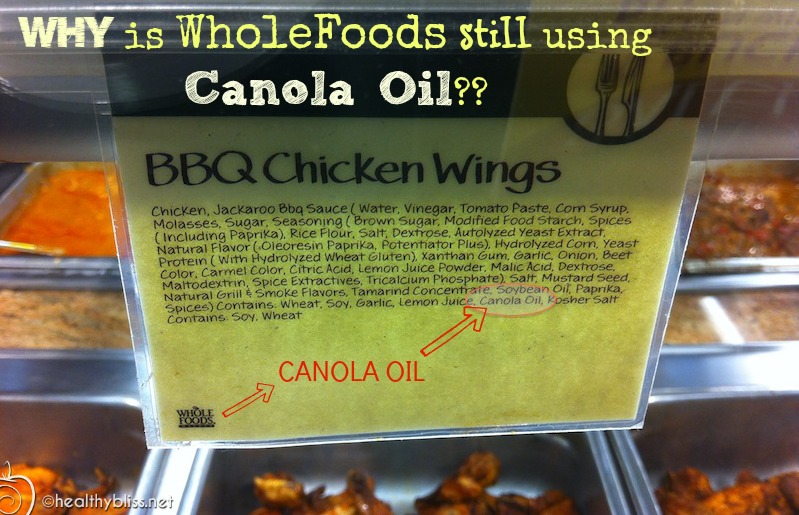
While there are many other “bad” ingredients in this food like yeast extract, the CANOLA OIL is obvious.
Why spend so much time on this issue when you can easily switch to coconut oil or olive oil or pure sunflower oil? There are many vegetable oil options which are heart-healthy, not rancid and made from whole, non-GMO ingredients.
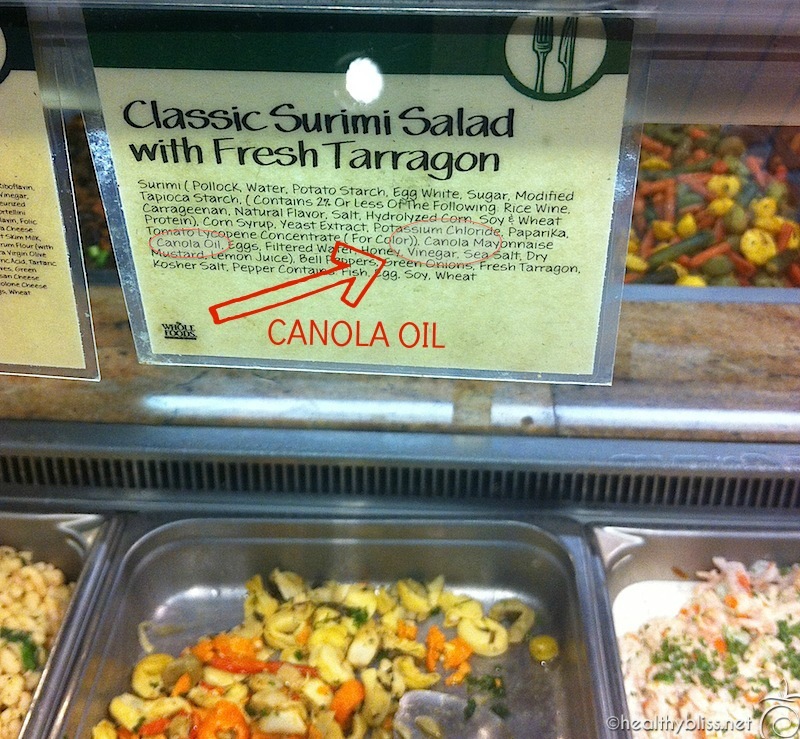
Again, many other ingredients here would stop me like carrageenan and hydrolyzed corn, but the CANOLA OIL is a definite No Thank You!
As a side note, Wholefoods admits to allowing other companies to sell GMO canola oil on their shelves.
Here are some examples:
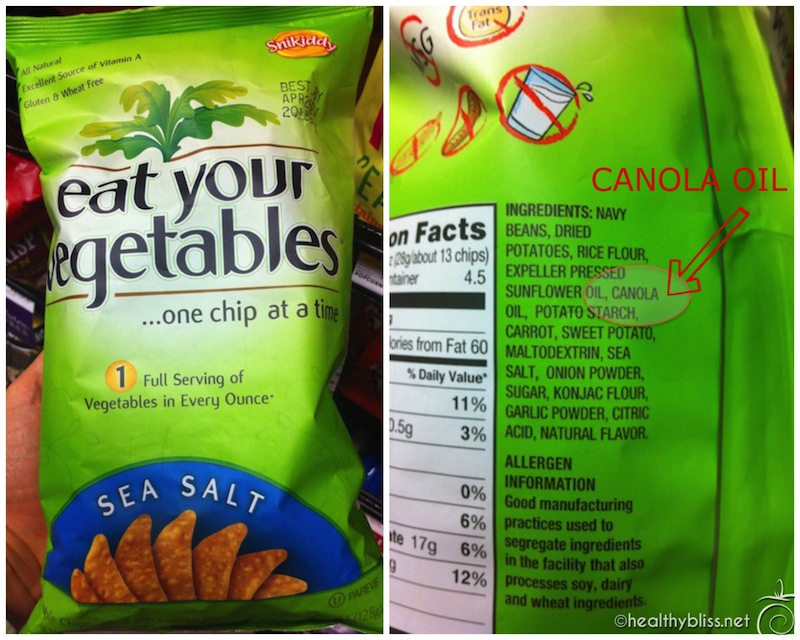
This product is gluten-free and wheat-free and “all natural”…well, except for the GMO Canola Oil
NOTE: This IS Genetically Modified Canola Oil since it is not listed as “organic” or ‘Non-GMO.”
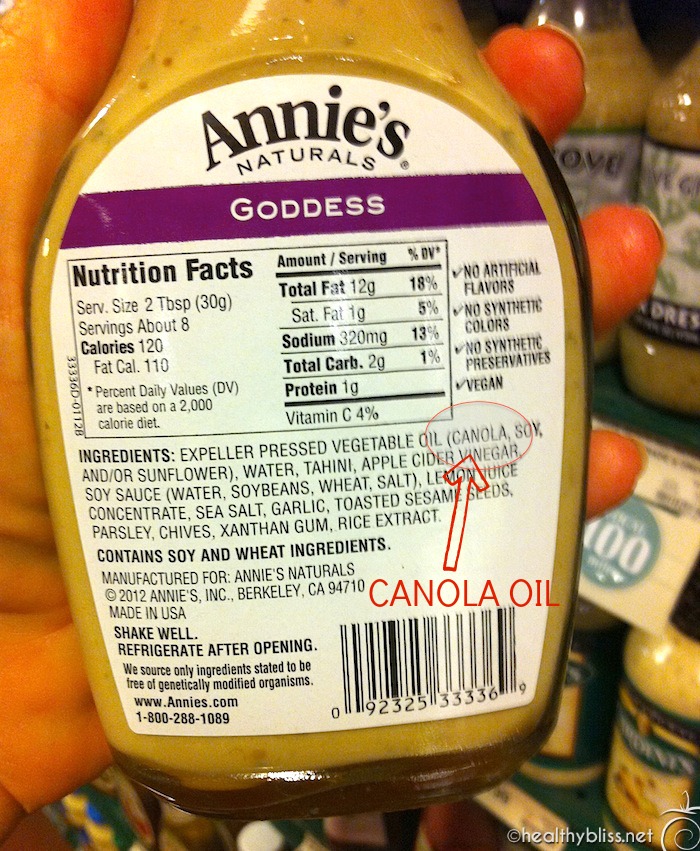
Notice how the label reads “No Synthetic Preservatives” instead of “No Synthetic Ingredients”? Hmmm….
What can you do?
1. Start reading labels. If you see canola oil in a product, baked good or salad bar item, don’t buy it!
2. Share this Information!! The only way to get the word out is to spread the word!!
When companies see sales going down as a result of what we know and don’t want, they will change!
More on GMO:
- What are Irradiated Foods? What you don’t know CAN hurt you!
- What I Learned from taking a traditional Nutrition Course…and What I Didn’t Learn
- What’s Wrong with Vegenaise
- MSG hidden in Packaged Foods: Why I don’t buy 90% of the ‘food’ at WholeFoods
- Genetically Engineered Food – No more Frankenfoods!
More on Whole Foods and Food Additives:
- Is your Olive Oil fake or “cut” with inferior oils? Check this list!
- What’s Wrong with Vegenaise
- Detox Reaction vs. Allergic Reaction or Intolerance – Which one is it?
- Knowing Botanical Food Families for Cross-Reactivity Allergies
- Why I don’t add Almond Milk, Soy Milk or Coconut Water to Green Smoothies

Follow Jennifer